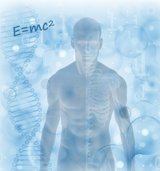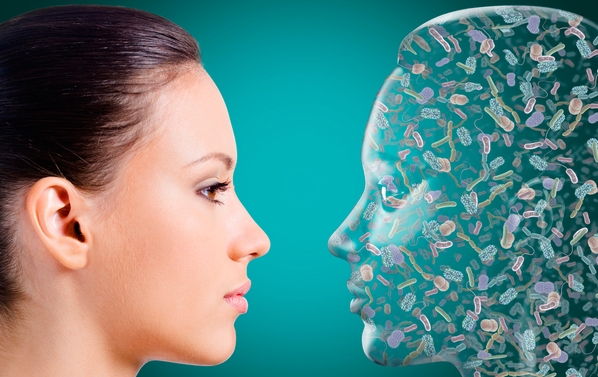Health and Wellness
Gut Bacteria Is “The Secret Key” to Your Health and Happiness
Since 2007, scientists at the National Institute of Health (NIH) Human Microbiome Project have been honing in on the phenomenon of bacteria hosted in the human body. In 2008, the European Commission and China created the Metagenomics of the Human Intestinal Tract Project (MetaHIT) to join this study.
For centuries, scientists have recognized a limited number of pathogenic bacteria for which antibiotic therapies have become the mainstream treatment. New DNA sequencing techniques coupled with data revealed from the Human Genome Project have made it possible to study a vast world of ‘germs’ – both pathogenic and beneficial – that dwarf our previous knowledge.[1]
While we inherit more than 22,000 genes from our parents, the bacteria that exist in and on our bodies sustain at least eight million bacterial genes, a whopping 360 times more bacterial genes than human genes. The genetic material from bacteria that populate the human body is known as the human microbiome.[2]
Your microbiome is likely similar to that of your immediate family, as we naturally inherit our family’s microbiota. Through the course of our lives, we pick up “hitchhikers”, bacteria from food, water, and various components of our environment. Scientists estimate that we each carry 100 trillion bacteria in our intestinal tract alone!
In this teeming landscape of bacteria, the host (that’s you) derives benefit while the other is relatively unaffected. This is known as a commensal relationship. However, some researchers favor the term mutualistic (both partners derive benefit) when describing the evolving bacterial communities in the gut.
The Balance of Bacteria and Your Health
In 2010, the Human Microbiome Project published an analysis of 178 genomes from bacteria that live in or on the human body. 10,000 different types of bacteria in the human body have been identified, including novel genes and proteins that serve functions in human health and disease.[3] The vast numbers of bacteria discovered appear to provide benefit to the human body, not harm.
Martin J. Blaser, chairman of the Department of Medicine and a professor of microbiology at the New York University School of Medicine states:
Germs make us sick, but everyone focuses on the harm. It’s not that simple, because without most of these organisms we could never survive.[4]
Further, he adds: “I have been a practicing physician and medical researcher for more than thirty years, and this is the most exciting and important work of my lifetime.”[5]
As scientists map the human microbiome, they are beginning to understand the difference between normal and abnormal. Proper bacterial balance is vital to healthy immune function, providing appropriate protection against potential infections, playing a critical role in the digestion and absorption of food and nutrients, and even regulating mood. The interaction of multiple strains of bacteria is an essential element in health and wellbeing.[6]
The optimal balance of bacteria can be altered in many ways.
- Broad spectrum antibiotics that kill bacteria in the gut indiscriminately[7]
- Prescription medications[8]
- Disease-carrying bacteria, fungi, parasites, and yeasts
- Stress[9]
- Lack of sleep[10]
- Poor Diet & Lifestyle[11]
- Geography[12]
- Travel[13]
- Physical disconnection with nature[14]
Researchers believe changes in gut bacteria may even affect the brain and personality. Germ-free mice have been shown to be dramatically more anxious and hyperactive than their counterparts with a normal microbiome. These changes have also been associated with neurochemical changes in the mouse brain.[15][16]
Evidence supports the concept that microbiota balance can have a large impact on healthy metabolic processes. This delicate balance has a definite impact on nutrient acquisition and overall energy regulation.
The impact of the gut microbiota is far reaching in the body. Continued investigation into the microbiome will yield powerful data, enabling the development of novel options to support healthy mood, metabolism, signaling molecules and much more. These trillions upon trillions of microorganisms, all coexist, and have a huge effect on your overall health and well-being.
This invisible system plays an incredibly important role in everything from your immunity and digestion… to your thoughts, feelings and emotions. It fights carcinogens and generates vitamins and nutrients…
And while most of the microbes living in our body work together for our good, scientists at the Harvard School of Public Health have found how we take care of our body may trigger some microbes to become pathogenic – or dangerous and disease-causing.
How to take good care of your microbiome
Here are some practical, everyday tips for you on how to take good care of your microbiome so it can take care of you:
- Avoid Processed Food - according to researchers, processed foods that are high in fat and sodium lead to a reduced microbiome. Not only do they lack the nutrients for microbiomes to thrive but eating high-calorie processed food also leads to unwanted weight gain.
- Increase Your Fiber Intake - research says that a high-fiber diet is the key to maintaining a good balance in your gut microbiome. They recommend a fiber intake of 30 grams per day. A high-fiber microbiome diet helps you lose weight. High-fiber foods make you feel fuller because they take longer to digest. The fuller you feel, the less food you’ll want to eat. Fiber also helps stimulate digestion.
- Eat Foods Rich in Probiotics - probiotics contain live culture bacteria and reinvigorate the microbiome in your body. These probiotics can typically be found in fermented food. However, not all fermented foods contain live cultures. Beer, wine, and soy sauce are too processed for good bacteria to live in them.
- Eat Prebiotic-Rich Foods - more than probiotics, prebiotics are also beneficial in maintaining good microbiome balance in your body. Prebiotics are substances that serve as nutrients for the microbiome within the human body. According to research, prebiotics help microorganisms in the body metabolize nutrients to promote the human body’s well-being, and also help in lowering cholesterol and preventing diabetes. Numerous studies also pointed out that prebiotics contribute to maintaining metabolic health, skin health, and maintaining immune function.Prebiotics are commonly found in certain soluble fermentable fibers and dietary fibers. Here are a few examples:
- Chicory Root (65% of fiber by weight)
- Jerusalem Artichoke, or earth apple (31.5%)
- Garlic (17.5%)
- Onions (8.6%)
- Leek (11.7%)
- Asparagus (5.0%)
- Wheat Bran (5.0%)
- Wheat Flour (4.8%)
- Add Polyphenol-Rich Superfoods into Your Diet - polyphenols balance the gut microbiome to contribute to overall gut health by allowing them to absorb prebiotics better. Polyphenols are compounds commonly found in medicinal herbs and dietary plants. Foods containing high polyphenol content are highly sought after because of their antioxidant effects, and natural aid to treating inflammation according to some studies.
- Give Intermittent Fasting a Try - a few studies have concluded that intermittent fasting positively impacts gut microbiomes. Fasting increases microbiome diversity in the colon and thereby leads to a more robust body by preserving gut health. Other than maintaining microbiome balance, intermittent fasting also helps with weight loss, enhanced immunity, increased longevity, and overall improved health. The basic concept behind intermittent fasting is to split your schedule into times for eating and times for fasting.There are many ways to do intermittent fasting:
- 16/8 Method: Eating period is only 8 hours within the day and fasting for the remaining 16 hours. For example, start eating at 9:00 AM and start fasting by 5:00 PM. If you’re not a breakfast person, you can also opt to start eating at 12:00 PM and stop food intake by 8:00 PM.
- 5:2 Method: Fast for two days and eat normally for the other five days. Fasting for two days means consuming only 25% of your daily calorie needs. So if you consume 1,600 calories normally for five days, then you should only consume 400 calories per day for the other two days.
- Eat-Stop-Eat Method: Fasting 20 to 24 hours once or twice a week. For example, you can eat normally for the next six days until 8:00 PM on the sixth day. Then, stop eating after 8:00 PM. You will then resume eating by 8:00 PM the next day.
- Consider Taking Supplements - if you aren’t into Kimchi and Kombucha, you may find it difficult to incorporate probiotics into your diet. Taking probiotic supplements may be a better option, and there are other supplements that work alongside them to support your microbiome:
- Take probiotic supplements to feed your body with good bacteria.
- Add magnesium supplements to activate your digestive system.
- Take fish oil supplements to keep gut microbiome healthy.
As we take care of the microorganisms in our body, we take care of ourselves. You can now take action to achieve microbiome balance in your body to improve your overall health.
Finally! A Probiotic Supplement with Prebiotics & Polyphenols
Most probiotics achieve a fraction of what they promise because they do not contain the prebiotics and polyphenols necessary to achieve the best gut health possible.
Enviromedica’s Synbiotic (Probiotic + Prebiotic) Based Terraflora™
Enviromedica’s soil-based, broad-spectrum synbiotic stands out from the rest as it is formulated with a combination of spore form probiotics, and advanced, food-based ancient prebiotics to nurture the microflora as they enter the gut. Due to the seed-like structure encasing the probiotic bacteria, they survive the GI tract to arrive in the lower intestine intact and alive.
Terraflora™ is a next generation probiotic plus prebiotic supplement designed for advanced gut microbiome support. It contains a specific selection of Bacillus bacteria, proven probiotic species found in traditional foods and ancestral diets. It is the combination of the strains, coupled with the ancient prebiotics that most successfully mimics the natural flora found in traditional and ancestral diets. Due to the complexity and vast variety of bacteria residing in the gut, the human microbiota thrive when fed this synbiotic blend.
Why Is Terraflora™ a Better Choice?
- Convenience: No need for refrigeration.
- Inherent Viability: A matrix of superior, highly-resilient microflora whose organic, seed-like structure survives the early GI tract to reach their target destination—the lower GI tract—intact, alive, and thriving in the intestine.
- Symbiotic Strains: A balanced formulation specially selected to mimic the natural flora found in traditional and ancestral diets.
- Shelf-stable: Highly resilient strains are protected against environmental factors
- Advanced Prebiotic Support: Unique formulation of diverse polyphenols and polysaccharides support healthy intestinal flora.
[1] Ursell, L. K., Metcalf, J. L., Parfrey, L. W. & Knight, R. 2012. Defining the human microbiome. Nutr Rev, 70 Suppl 1, S38-44.
[2] 2012. NIH Human Microbiome Project defines normal bacterial makeup of the body [Online]. National Institutes of Health: US Dept of Health & Human Services. Available: https://www.nih.gov/news-events/news-releases/nih-human-microbiome-project-defines-normal-bacterial-makeup-body [Accessed].
[3] Human Microbiome Jumpstart Reference Strains, C., Nelson, K. E., Weinstock, G. M., Highlander, S. K., Worley, K. C., Creasy, H. H., Wortman, J. R., Rusch, D. B., Mitreva, M., Sodergren, E., Chinwalla, A. T., Feldgarden, M., Gevers, D., Haas, B. J., Madupu, R., Ward, D. V., Birren, B. W., Gibbs, R. A., Methe, B., Petrosino, J. F., Strausberg, R. L., Sutton, G. G., White, O. R., Wilson, R. K., Durkin, S., Giglio, M. G., Gujja, S., Howarth, C., Kodira, C. D., Kyrpides, N., Mehta, T., Muzny, D. M., Pearson, M., Pepin, K., Pati, A., Qin, X., Yandava, C., Zeng, Q., Zhang, L., Berlin, A. M., Chen, L., Hepburn, T. A., Johnson, J., Mccorrison, J., Miller, J., Minx, P., Nusbaum, C., Russ, C., Sykes, S. M., Tomlinson, C. M., Young, S., Warren, W. C., Badger, J., Crabtree, J., Markowitz, V. M., Orvis, J., Cree, A., Ferriera, S., Fulton, L. L., Fulton, R. S., Gillis, M., Hemphill, L. D., Joshi, V., Kovar, C., Torralba, M., Wetterstrand, K. A., Abouellleil, A., Wollam, A. M., Buhay, C. J., Ding, Y., Dugan, S., Fitzgerald, M. G., Holder, M., Hostetler, J., Clifton, S. W., Allen-Vercoe, E., Earl, A. M., Farmer, C. N., Liolios, K., Surette, M. G., Xu, Q., Pohl, C., Wilczek-Boney, K. & Zhu, D. 2010. A catalog of reference genomes from the human microbiome. Science, 328, 994-9.
[4] Specter, M. 2012. Germs Are Us [Online]. The New Yorker. Available: https://www.newyorker.com/magazine/2012/10/22/germs-are-us [Accessed].
[5] Specter, M. 2012. Germs Are Us [Online]. The New Yorker. Available: https://www.newyorker.com/magazine/2012/10/22/germs-are-us [Accessed].
[6] Ley, R. E., Peterson, D. A. & Gordon, J. I. 2006. Ecological and evolutionary forces shaping microbial diversity in the human intestine. Cell, 124, 837-48.
[7] Maier, L. & Typas, A. 2017. Systematically investigating the impact of medication on the gut microbiome. Current Opinion in Microbiology, 39, 128-135.
[8] Maier, L. & Typas, A. 2017. Systematically investigating the impact of medication on the gut microbiome. Current Opinion in Microbiology, 39, 128-135.
[9] Foster, J. A., Rinaman, L. & Cryan, J. F. 2017. Stress & the gut-brain axis: Regulation by the microbiome. Neurobiology of Stress, 7, 124-136.
[10] Trinder, M., Bisanz, J.E., Burton, J.P., Reid, G. 2015. Bacteria Need “Sleep” Too?: Microbiome Circadian Rhythmicity, Metabolic Disease, and Beyond. UTMJ, 92, 52-55.
[11] Conlon, M. A. & Bird, A. R. 2014. The impact of diet and lifestyle on gut microbiota and human health. Nutrients, 7, 17-44.
[12] Conlon, M. A. & Bird, A. R. 2014. The impact of diet and lifestyle on gut microbiota and human health. Nutrients, 7, 17-44.
[13] Riddle, M. S. & Connor, B. A. 2016. The Traveling Microbiome. Curr Infect Dis Rep, 18, 29.
[14] Tasnim, N., Abulizi, N., Pither, J., Hart, M. M. & Gibson, D. L. 2017. Linking the Gut Microbial Ecosystem with the Environment: Does Gut Health Depend on Where We Live? Front Microbiol, 8, 1935.
[15] Neufeld, K. M., Kang, N., Bienenstock, J. & Foster, J. A. 2011. Reduced anxiety-like behavior and central neurochemical change in germ-free mice. Neurogastroenterol Motil, 23, 255-64, e119.
[16] O’mahony, S. M., Clarke, G., Borre, Y. E., Dinan, T. G. & Cryan, J. F. 2015. Serotonin, tryptophan metabolism and the brain-gut-microbiome axis. Behav Brain Res, 277, 32-48.
Body-Field Scan
Ready to find out what's impacting your energy levels by using our bioenergetic scanning technology. Check out your body’s energy with a Body-Field scan, and gain deeper insight into your holographic self with our certified Bioenergetic Practitioner. For an In-Clinic visit click here, or, for a Telehealth (remote) session click here.
We offer a completely new, alternative and bioenergetic health care approach based on 21st century science, technology and quantum physics with personalized, holistic therapy solutions such as, NES body-field scan & therapy, miHealth biofeedback, PEMF, Rife and Vibroacoustic (VAT) healing modalities that can restore optimal health and well-being throughout the body, mind and spirit in the most natural way. Let us help you restore your health and energy!






